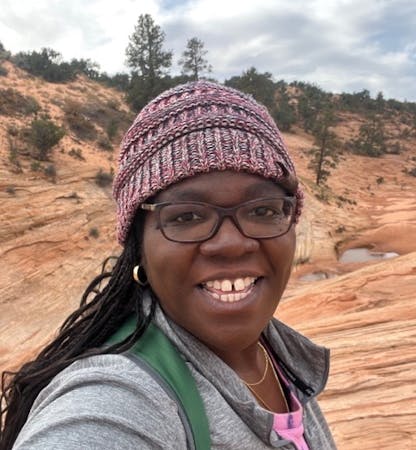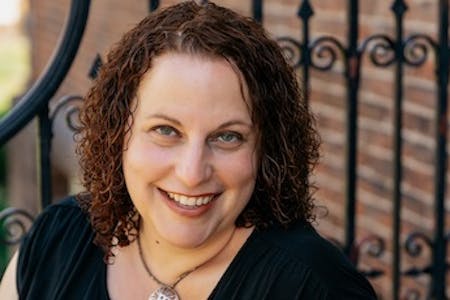Joi Spencer and Kerri Ullucci open difficult conversations with their classroom teacher expertise, Spencer’s lived experiences as a Black student.
The title of “Anti-Blackness at School: Creating Affirming Educational Spaces for African American Students,” leaves nothing to the imagination, and indeed, co-authors Joi Spencer (’06, PhD) and Kerri Ullucci (’05, PhD) intended it that way. The interracial perspectives of the book – by Spencer, who is Black and from Los Angeles, and Ullucci, who is White and hails from Rhode Island – are girded by the co-authors’ experiences as classroom teachers, and by Spencer’s own personal history as a Black student in L.A. schools. The co-authors were moved to write the book after nearly 20 years of on-going conversations, as well as their education in the UCLA division of Urban Schooling and how it shaped their research and practice.
Ullucci is an associate professor of diversity and equity in schools at Roger Williams University in Providence. She achieved her B.A. in history and public policy at Carnegie Mellon University and her M.A.T. at the University of Pittsburgh. Spencer, who in January took the helm as dean of the School of Education at UC Riverside, achieved her B.A. in African and African American studies with honors in education, as well as her master’s degree in education at Stanford University.
Spencer, Ullucci, and UCLA Professor of Education Tyrone Howard will present a professional development session at the Annual Meeting of the American Educational Research Association (AERA) in April on academic writing for graduate students and new faculty.
Ullucci and Spencer share their inspirations for the book and salute the UCLA faculty who helped shape their work the most. “Anti-Blackness at School: Creating Affirming Educational Spaces for African American Students” is dedicated to the late UCLA Professor of Education Mike Rose.
How has your experience in the classroom informed the writing of “Anti-Blackness in School”?
Joi Spencer: It is both: my experience being a student in the classroom [and] my experience being a teacher in the K-12 classroom. There are a lot of personal examples in the book where I’m able to reflect on my own experience. I grew up in South Los Angeles. Busing was a huge thing when I was a kid, and so I was bused out of my neighborhood and into for the most part, predominantly White middle class communities.
A lot of the ideas I talk about in the book are experiences that I had in schools that seemed like they were egalitarian, seemed like they were equitable. But when you scratch the surface, you could see clearly who was getting honors classes, who was not; who was getting tested for gifted and who was not; how they spoke to students… A lot of assumptions were made – “Oh, you’re from that neighborhood. Your parents must not care.”
Most of the kids I I grew up with didn’t speak a lot of standard English. Their parents were from the South. My mother is from the Midwest, so I didn’t have a Southern accent. I think a lot of teachers saw me as maybe a little bit more intelligent than the kids who may have been African American and Southern, who was seen as maybe not as intelligent. So, there were these little subtle things that if you paid attention – which I was, I think, good at paying attention – they kind of bubbled up to the top.
By the end of middle school, there were these two very distinct paths that we all had already been set on, but it happened in very, very quiet ways. “Oh, you’re going to be in that reading group,” but you were never told what the implications of that reading group were. If you were put into that lower tier, there were huge implications for what happened to you in junior high and definitely in high school.
Kerri Ullucci: Both Joi and I were classroom teachers before we became professors. I used to teach fourth grade in an urban location. We worked mostly with kids of color. And now, we both prepare teachers to teach, and the issues around race are always critical.
We both went to UCLA because of the focus on Urban Schooling, and that’s a rarity – a program that’s so anchored in the importance of equity lenses and of paying attention to who is in front of you. My interest in this work unquestionably started from my experience with UCLA.
How do you seek to make educators – both non-Black and Black – more aware of anti-Blackness?
Spencer: Most Black children are going to be taught by non-Black teachers. Sometimes we’ll have White teachers say, “You know, I’m just not able to do that.” They’re uncomfortable. And we tell them that we rely on non-Black teachers to help students of color be successful. The first thing folks need to understand is that you don’t get a pass because you’re not Black. We all have to lean in, all of us. I don’t get a chance to say, “Well, I’m not White, so when I have a White student in my class, I can’t help them.” They’re all of our students. They’re all of our kids.
That’s why a lot of the work in critical race theory is important. So much of what we hear is plagued with negativity about critical race theory, but at its foundation it’s trying to help us get a greater level of comfort about thinking about racism as something that impacts flows through our society, and then we have to get the courage to start facing it, talking about it, leaning into it.
In the book, we raise awareness by helping people acquire the language for the idea that race and racism are real things. We say that a student can get special services if they have a special need or if they speak in a language other than English. But there are no special services for a kid if they are Black, because race is not something that is called out.

Joi Spencer (’06, Ph.D., Urban Schooling) is the dean of the College of Education at the University of California, Riverside. Courtesy of Joi Spencer
Ullucci: The vast majority – about 85 percent – of my students are White, and while equity and diversity needs to be developed along all pathways, for me, it’s in working with White teachers or White students who are going to be teachers.
Being able to have these conversations with them is more important, or at least as important as talking to any other group, because it’s the behavior that needs to change. It’s the kind of mythologies [about Black students] that need to change for them, to be able to see this in a more realistic light and to continue to have conversations about specificity. Anti-Blackness has been a specific form of oppression for a really long time and that plays out in a really particular way. All that is important in working with White teachers to get them to break the patterns that we see.
My most foundational experiences of being a teacher were in multiethnic schools where I was often the minority. That really shaped the way that I do all the work that has come subsequently. The last year that I taught, I was in a classroom where I was the only White person in the room. I remember people [saying things] like, “Oh, I’m sorry that you teach in this school,” and I was always so offended that they would feel sorry for me. I lived this immeasurably rich experience from being with kids from all over the world.
Sometimes I think White teachers get kind of caught in this mythology about what it is to be a White teacher in multicultural environments: what it means for the students, how successful you can be, and how you can connect with people. So much of it is built around stories that aren’t true, and we don’t always take the time to deconstruct that.
A lot of my personal mentors as teachers – like the person that I worked under as a student teacher, and then my doctoral advisor – are Black people. And so, a lot of my understanding about how you teach was through a Black lens. I know that that’s rare, and that has helped me to this day.
I remember sitting in Tyrone’s (Howard, UCLA professor of education) classes. I was his TA, working with the master’s students and I can remember things that he said, and the way that he would approach different topics that I knew were different from the way that I would. Part of that is gender, and part of that is race. I can say things that he can’t say, and he says things that I can’t say. Being able to see that when I was developing as an instructor was really important. I’ve been in these unique situations, and I very much value them, because they’ve definitely put me on the path that I’m on now.
How did your experiences at UCLA in Urban Schooling shape your research and your practice as teachers, and now, as teacher educators?
Spencer: UCLA was an incredible training ground for Kerri and I. We were studying these issues even then. Dr. Mike Rose, who since passed away, was an incredible mentor of ours, and helped teach us how to write in a way that is accessible to teachers and accessible to the public.
We actually dedicate the book to him because of his impact on our writing and helping us to see that when you write as a scholar, it’s not about the big words but relaying ideas in a way that makes people comfortable and is accessible. His support of us was just profound.
Dr. Megan Franke (UCLA professor of education) had a very big influence on my work. She has taught thousands and thousands of teachers how to teach mathematics better and she believes in the day to day, on the ground work of improving teaching. As my advisor and mentor, she has helped me to weave together my ideas about educational equity/racial justice with my commitments to designing and delivering mathematics instruction of impact. I see these as inseparable.

Kerri Ullucci (’05, Ph.D., Urban Schooling) is the associate professor of diversity and equity in schools at Roger Williams University in Providence. Courtesy of Kerri Ullucci
Ullucci: Joi and I have literally been writing for 20 years. She and I became colleagues, and then very good friends from our being in the cohort together. Twenty years later, we are still colleagues and friends. I always look back with such gratitude that I’ve been able to maintain these relationships so long after.
It’s the same thing with Tyrone. I was his very first doctoral student when he came to UCLA,and it’s such a blessing that literally, 21 years from when I started, he is still such a central figure and mentor in my life, and has meant so much to the trajectory that I’m on. I would not be in this field if it wasn’t for his mentorship when I was his student.
What is the most important thing you hope people will take away from the book?
Ullucci: This book has been simmering on the back burner for years. It was cool to actually sit down and do this because we had bits and pieces of things that we had been wanting to say for a decade, so it reads a little bit differently. It’s more like a walk-through of the professional lives of people who are trying to think hard about these things. We’ve been collecting experiences for a long time and trying to put it together in a way that we thought would serve teachers.
We were very much thinking about practitioners, and about the way that we translate what we’re seeing for mass audiences, versus talking to very niche populations. The tone of it, and the suggestions in it are written to address that audience, so hopefully, that will make it usable by most people.
Spencer: I hope they read the personal stories that are in there – those matter a lot. But I also hope that teachers don’t shy away from some of the tougher work. A lot of the book’s goal is to raise comfort with talking about race as a factor that shapes what goes on in the classroom and the schoolyard, getting rid of the fear of it.
A part of it is letting young people tell their stories [and] listening. I tell a little bit of my educational autobiography, and I think it’s a little bit disarming when a person is telling you truth from their experience. It opens up a little space in you. It’s not about pointing fingers and saying you are racist. It’s basically saying, race shapes. Racism influences all of us.
There’s an example in the book from parents I’ve worked with. Their daughter is in a classroom that is studying culture. At the end of the unit, the teacher asks every child, every family, to bring some food to this cultural fair… to share about [their] culture. They’re an African American family, and their daughter is the only Black child in that grade level.
When the family arrives at the auditorium, they’ve brought a pie to the fair and they’re walking around, trying to figure out where to put it. There is no designation anywhere in the auditorium for African American [culture]. There was Jewish, there was Italian – there was everything else.
And so, these parents are walking around with their kid, and they go to her teacher and say, “Well, where would you like us to put ours, because there’s nothing [designated] here.” And the teacher says, kind of flippantly, “Just put your pie on the Mexican table.”
You can imagine the horror on these parents’ faces. These teachers have had this Black child in their class all this time, and they haven’t created a space for African American culture. It’s not even acknowledged. And what about [the teachers’] thinking about Mexican Americans? That it’s all the same: you people of color are all the same.
I think teachers are sort of trained to be race-less and to be color blind – “We judge people ‘not by the color of their skin, but by the content of their character.’” This is used to sort of erase [race], and not speak about race at all, as if it doesn’t actually have impact. But, that was not what Martin Luther King intended by his words. You can’t ignore something – that does not honor it. That is not a solution.
